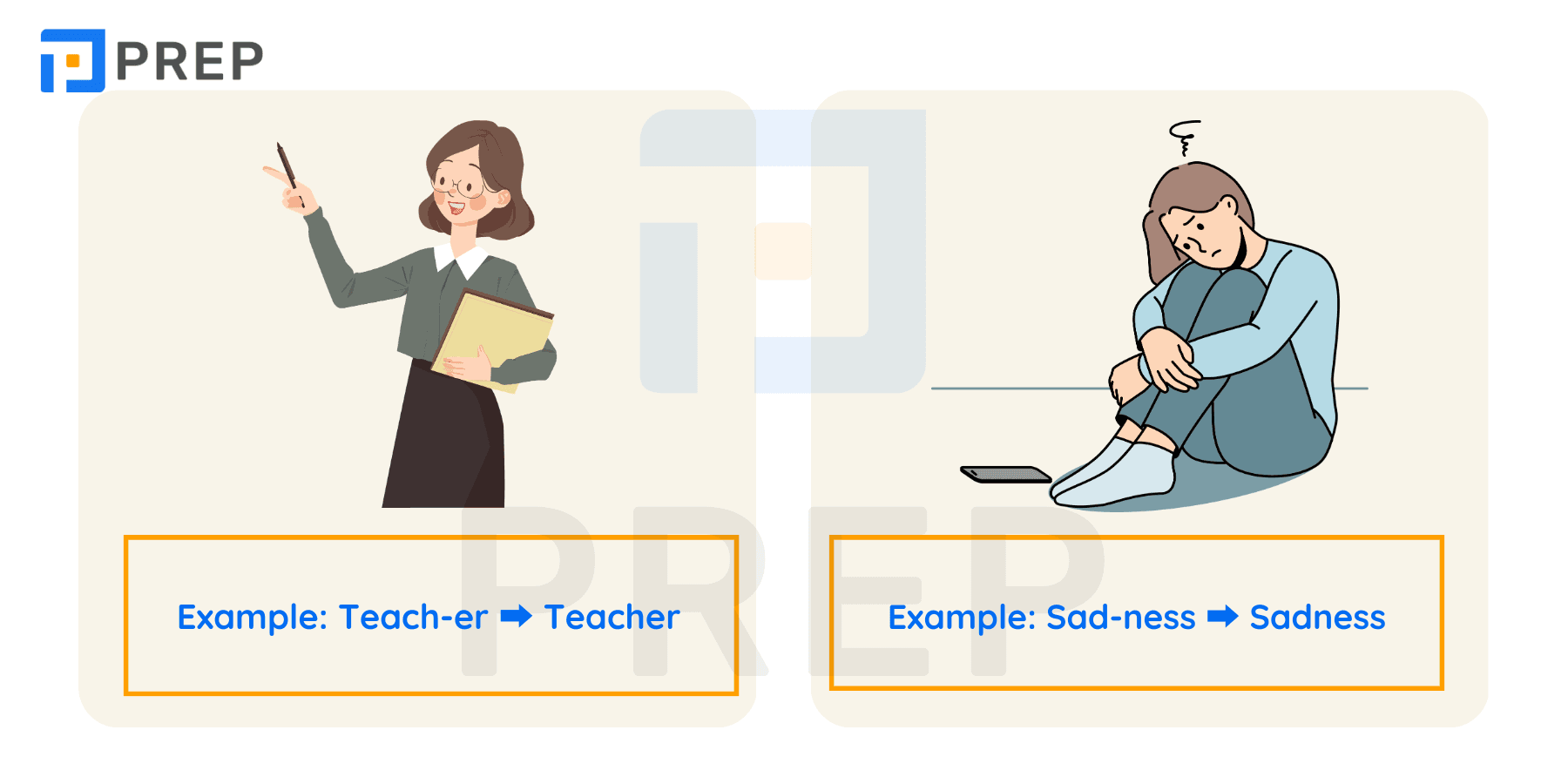Noun Suffixes in English Grammar with Examples
Noun suffixes are essential for expanding your academic and everyday vocabulary in English. This guide explains what noun suffixes are, how they work, and why they matter—especially in writing and exams like IELTS. Get practical examples, spelling tips, and exercises with answers.

I. What Are Noun Suffixes?
Noun suffixes are endings added to the base form of a word—usually a verb or an adjective—to create a noun. These suffixes help turn an action, state, or quality into a person, concept, or thing. Understanding noun suffixes is essential for expanding your vocabulary and using more precise and academic language in both writing and speaking.

Why should you learn noun suffixes?
- They help you recognize and understand new words quickly.
- They allow you to transform words across word types, especially when writing essays or reports.
- They are commonly used in formal exams like IELTS, TOEIC, and academic writing tasks.
List of the 15 most common noun suffixes

|
Noun suffixes |
Example |
Meaning |
|
-ness |
happiness |
the feeling of being happy |
|
-ment |
development |
the process in which someone or something grows or changes and becomes more advanced |
|
-tion/-sion |
information |
facts about a situation, person, event, etc. |
|
recession |
a period when the economy of a country is not successful and conditions for business are bad |
|
|
-ity |
creativity |
the ability to produce or use original and unusual ideas |
|
-ism |
capitalism |
an economic and political system in which property, business, and industry are controlled by private owners rather than by the state, with the purpose of making a profit |
|
-ance/-ence |
importance |
the quality of being important |
|
dependence |
the situation in which you need something or someone all the time, especially in order to continue existing or operating |
|
|
-hood |
childhood |
the time when someone is a child |
|
-ship |
friendship |
a situation in which two people are friends |
|
-age |
marriage |
a legally accepted relationship between two people in which they live together, or the official ceremony that results in this |
|
-er/-or |
singer |
a person who sings |
|
doctor |
a person with a medical degree whose job is to treat people who are ill or hurt |
|
|
-ist |
artist |
someone who paints, draws, or makes sculptures |
|
-ity |
university |
a place where people study for an undergraduate (= first) or postgraduate (= higher level) degree |
|
-cy |
efficiency |
the quality of achieving the largest amount of useful work using as little energy, fuel, effort, etc. as possible |
|
-ing |
reading |
the skill or activity of getting information from books |
II. Noun formation in English
One of the most effective ways to build your English vocabulary is by learning how nouns are formed from other word types. In English, nouns are often created by adding suffixes to verbs and adjectives. These suffixes change the form—and often the meaning—of the base word, turning actions or qualities into people, concepts, or things.

1. Suffixes that form nouns from verbs
Many English nouns are formed by adding suffixes to verbs. These suffixes indicate an action, a process, a result, or a state related to the base verb. Mastering this transformation helps expand your vocabulary significantly, especially in formal writing and exams.
Common noun-forming suffixes from verbs
|
Suffix |
Base Verb |
Noun |
Meaning |
|
-ment |
develop |
development |
the process or result of developing |
|
-tion |
educate |
education |
the act or state of educating |
|
-sion |
decide |
decision |
the result of deciding |
|
-al |
approve |
approval |
the act or process of approving |
|
-ance |
perform |
performance |
the act of performing |
|
-ence |
differ |
difference |
the condition of being different |
Example sentences
- The development of smart cities is a key global trend.
- Receiving positive feedback boosted her confidence.
- A university education is still valued in many societies.
- The manager gave her approval for the project.
- His decision surprised everyone in the meeting.
- The company's performance improved in the second quarter.
Tips for learners
- -tion and -sion are among the most frequently used noun suffixes in academic writing.
- Some spelling changes may occur when the base verb ends in -e, -y, or consonant + e (we'll review this in the next section on spelling rules).
2. Suffixes that form nouns from adjectives
Adjectives can often be turned into nouns by adding specific suffixes. These noun forms usually express a quality, state, or condition. Learning these transformation patterns will improve your writing variety and support more formal, precise communication.
Common noun-forming suffixes from adjectives
|
Suffix |
Adjective |
Noun |
Meaning |
|
-ness |
happy |
happiness |
the state or quality of being happy |
|
-ity |
responsible |
responsibility |
the condition of being responsible |
|
-cy |
efficient |
efficiency |
the ability to do something effectively |
|
-ship |
friend |
friendship |
a relationship between friends |
Example sentences
- Her happiness was obvious when she got the job offer.
- Time management shows a sense of responsibility.
- The team improved their efficiency over time.
- Their friendship has lasted since childhood.
Tips for learners
- -ness is the most flexible suffix and can be used with many common adjectives.
- Be careful with spelling changes: adjectives ending in -y often change to -i before adding -ness (e.g., busy → busyness).
- -ity usually attaches to Latinate or formal adjectives and may involve vowel/consonant shifts in spelling.
3. Suffixes showing person or occupation
Many English nouns that refer to people or professions are created by adding specific suffixes to verbs or nouns. These suffixes help identify who performs an action or holds a particular role.
Recognizing these patterns not only expands your vocabulary but also helps you describe people clearly in both formal writing and everyday conversation.
Common suffixes that refer to a person or occupation
|
Suffix |
Base Word |
Noun |
Meaning |
|
-er |
teach |
teacher |
someone who teaches |
|
-or |
act |
actor |
someone who performs or carries out actions |
|
-ist |
art |
artist |
a person skilled or active in a subject |
|
-ian |
music |
musician |
someone professionally involved in a field |
Example sentences
- My sister is a teacher at a public school.
- He became a famous actor after his first film.
- The artist displayed her paintings at the gallery.
- She’s a talented musician who plays the violin.
Tips for learners
- -er is the most commonly used suffix to form nouns indicating the doer of an action.
- -ist often refers to someone with a deep or professional connection to a subject (scientist, journalist).
- Be aware of spelling shifts, especially with verbs ending in -e (write → writer, not writeer).
III. Noun Suffix Rules and Spelling Changes
When forming nouns with suffixes in English, it’s important to pay attention not only to meaning but also to spelling changes. Some suffixes cause the base word to change in form before the suffix is added. Recognizing these common rules will help you avoid spelling errors and use noun forms more confidently in both writing and exams.
Basic spelling rules when adding noun suffixes
|
Base Word Ending |
Rule When Adding a Suffix |
Example |
|
Ends in e |
Drop the e before a suffix starting with a vowel |
create → creation |
|
Ends in y after a consonant |
Change y to i |
happy → happiness |
|
Ends in y after a vowel |
Keep the y, just add the suffix |
enjoy → enjoyment |
|
Ends in e and suffix starts with consonant |
Keep the e |
hope → hopeful |
|
One-syllable words ending in consonant + vowel + consonant |
Double the final consonant before -ion or -ing |
submit → submission |
Tips to remember
- Use a word family approach: learn verbs + their noun forms together (e.g., apply → application).
- If unsure, check a reliable dictionary (e.g., Cambridge or Oxford) for correct spelling and form.
- Practice suffix patterns with real sentence examples to reinforce spelling + usage in context.
IV. Academic and Exam-Ready Noun Suffixes
In academic writing and standardized tests like IELTS, using accurate and varied noun forms helps boost your score—especially in Writing Task 2 where vocabulary range and precision are evaluated under the Lexical Resource criterion.
Knowing key noun suffixes can help you transform verbs and adjectives into formal, academic-sounding nouns, which is essential for writing essays that present clear ideas and arguments.
Sample vocabulary by IELTS Writing topic
- Environment: pollution, conservation, waste management, sustainability
- Education: admission, curriculum, qualification, literacy
- Economy: investment, employment, productivity, inflation
- Government / Society: regulation, policy, equality, citizenship
How noun suffixes improve your writing?
- Help avoid repetition of verbs (e.g., using application instead of apply repeatedly).
- Make your tone more formal and academic, as expected in IELTS Band 7+.
- Clarify abstract ideas (e.g., freedom, development, responsibility) in structured essay arguments.
Example sentences (IELTS-style)
- Education plays a vital role in shaping individuals and societies.
- The development of modern cities often causes environmental challenges.
- Governments should take responsibility for promoting public health.
- Globalization has led to increased competition in international markets.
Mastering these noun suffixes gives you access to a wide range of academic and topic-specific language. In the next section, we’ll provide targeted exercises to practice identifying, forming, and correctly using noun suffixes.
V. Exercises on noun suffixes with answers
Let's practice the following exercises to gain more knowledge about noun suffixes!
Exercise 1: Match the following noun suffixes with the appropriate verbs, nouns, and adjectives to form the correct nouns.
|
Verb/noun/adjective |
Noun suffix |
|
|
Exercise 2: Complete the sentence with the suitable noun form
-
Her unique clothing style reflects her______(individual).
-
The professor's______(intelligent) is evident in the way he explains complex theories.
-
The Olympic team consisted of athletes from various countries, each proud of their______(national).
-
The concert provided an evening of great______(entertain) for the audience.
-
His______(obsess) with collecting rare coins has turned into a lifelong hobby.
Exercise 3: Choose the correct answer
1. The______patiently explained the complex mathematical concept.
A. Teach
B. Teacher
C. Teaching
2. The movie offers two hours of ______ for the audience.
A. Entertainment
B. Entertain
C. Entertaining
3. Can I get some _______ on uni courses?
A. Informative
B. Informing
C. Information
4. As the team leader, Sarah took on the ______of ensuring that each team member completed their tasks on time.
A. Responsibility
B. Irresponsibility
C. Responsible
5. We all watched in _______as he juggled three flaming torches.
A. Amazing
B. Amazed
C. Amazement
6. Different cultures and eras have different ideas of what makes someone a great _______.
A. Beautiful
B. Beauty
C. Beautifully
7. Unfortunately, I lost _______halfway through the film.
A. Interesting
B. Interested
C. Interest
Answers
|
Exercise 1 |
Exercise 2 |
Exercise 3 |
|
|
|
VI. Crack the IELTS Exam With Confidence
Through this post, PREP hopes you have gained an understanding of 15 common English noun suffixes. If Want to learn the secrets to IELTS success, explore these powerful course today:
-
IELTS preparation: Master Every Section of IELTS

Hi I'm Chloe, and I am currently serving as an Product Content Administrator at Prep Education. With over five years of experience in independent online IELTS study and exam preparation, I am confident in my ability to support learners in achieving their highest possible scores.
Comment
Premium content
View allPersonalized roadmap
Most read












